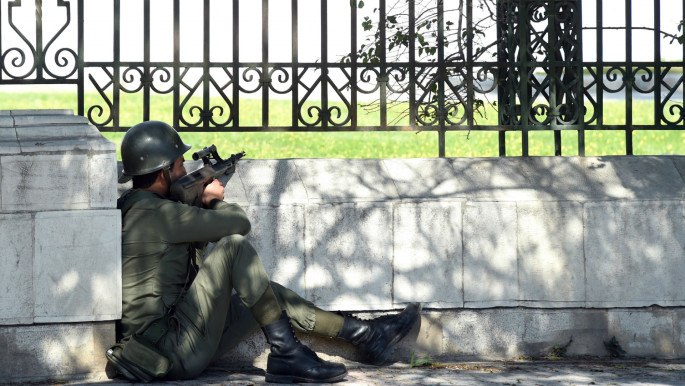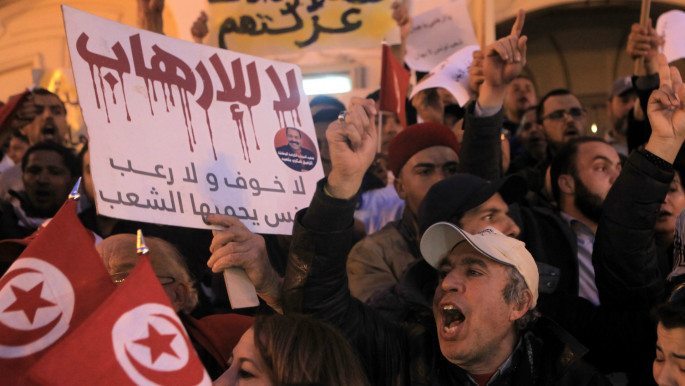Tunisia vows 'merciless war against terrorism' after museum attack
Tunisia's president promised to wage a "merciless war against terrorism" after gunmen killed 18 foreign tourists and two Tunisians in a daylight attack in the birthplace of the Arab Spring.
As the international community denounced Wednesday's assault on the National Bardo Museum in Tunis, which also left more than 50 people wounded, President Beij Caid Essebsi vowed Tunisia would fight "to our last breath".
| We are in a war against terrorism... We will fight them without mercy to our last breath - Tunisian President Essebsi |
"I want the Tunisian people to understand that we are in a war against terrorism and that these savage minorities do not frighten us," said Essebsi, who visited some of the dozens being treated for wounds in a Tunis hospital.
"We will fight them without mercy to our last breath."
The gunmen, dressed in military uniforms, opened fire on the tourists - including visitors from Britain, Italy, France, Australia, Colombia, Poland and Spain - as they got off a bus then chased them inside the museum, said Prime Minister Habib Essid.
Essid named the two gunmen killed by security forces as Yassine Abidi and Hatem Khachnaoui.
But "for the moment we cannot say if they belong to one or another terrorist organisations," he told RTL French radio.
He said Abidi was known to the police.
A Spanish man and a pregnant Spanish woman who had been inside the museum during the attack hid in the building all night in fear and were retrieved safely Thursday morning by security forces.
An employee hid the two Spaniards in an office during the four-hour rampage. All three were taken to hospital for medical checks after their ordeal.
 |
|
Razor wire ringed the National Bardo Museum on Thursday and security forces guarded major thoroughfares, while authorities hunted for the remaining attackers. The ministry announced that the museum will reopen by Tuesday.
The assault drew strong condemnation from world leaders.
US Secretary of State John Kerry denounced the "wanton violence" while British Prime Minister David Cameron said he was "appalled" by the attack and French President Francois Hollande expressed "solidarity" with the country.
United Nations Secretary-General Ban Ki-moon slammed the "deplorable" and "heinous" act and conveyed his "deepest sympathies" to the families of the victims.
Meanwhile the UN Security Council stressed that "no terrorist attack can reverse the path of Tunisia towards democracy".
US First Lady Michelle Obama, speaking on behalf of herself and her husband during a visit to Tokyo Thursday, said: "Our hearts go out to the loved ones of those who were lost here in Japan and around the world."
The leader of the Islamist opposition party Ennahda, Rached Ghannouchi, said he was convinced that "the Tunisian people will stay united in the face of barbarity".
MP Mbarka Brahmi, widow of assassinated Tunisian politician Mohamed Brahmi, told al-Araby al-Jadeed that the attack was "a catastrophe in every sense of the word."
Political analyst and expert in the affairs of Islamic groups, Alaya Allani, believes that although at this stage reasons for the Bardo attack are unknown, he states it could possibly be a "reaction" to the detention of "around 400 terrorists."
Tunisia has faced scattered extremist violence, and a disproportionately large number of Tunisians have joined Islamic State fighters in Syria and Iraq.
Twitter accounts associated with the group praised the attack. Ifriqiyah Media, which has aired claims from Tunisian extremists in the past, posted what it said were details about the attack, according to the SITE Intelligence Group, which monitors extremist activity online. The post calls on Muslims to attack tourists, but does not say who orchestrated the attack.
 |
|
Legislator Bochra Belhaj Hmida, of the secular majority party Nida Tunis, told the Associated Press that about 2,000 suspected terrorists are believed to be in Tunisia, many of whom joined extremists in Iraq or Syria then returned home.
"They are in a situation of being lone wolves, where each of them is free to do the actions they want," she said. "These are people who are let loose with weapons and wherever they can strike, they will not forgo the opportunity."
Tunisia's main trade union confederation and other civil society groups called for a silent demonstration Thursday outside the museum.
The groups called on Tunisians to gather outside the National Bardo Museum "to demonstrate our national unity in the fight against terrorism."
- With extra reporting by AFP



